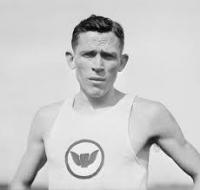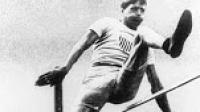1908 LONDON, U.K.

U.S. competitor Melvin Winfield Sheppard won Gold in 800- and 1500-meter runs.

American Ray C. Ewry continued to dominate in standing broad jump and standing high jump.
Editor’s note: As the 31st Games of the Olympiad approaches, August 5-21 in Rio de Janeiro, I thought it would be interesting to resurrect stories of former Olympics as written in Coconut Times in the summer of 1992, year of the Games in Barcelona, Spain.
The Olympics in 1908? It was a time which mirrors the 1990s. The athletes from Finland protested by marching into the Shepherd Bush Stadium in London, flagless; because they refused to carry the flag of their then ruling country, Russia (Eastern Europe deja vu?). The Irish were angry because they had to compete under the British flag (are you listening IRA?). The Americans and British almost had a second revolution as a result of the running of the 499-meter run. There were charges of professionalism, and it rained for two weeks (the ozone layer was a factor even then).
In other news, there were four sets of candidates for the office of President of the United States: Republican, Democratic, Socialist and Prohibition. Think of that misters Bush, Clinton, Brown, Perot and Bucitanan. General Motors was started. Ford introduced the “Model T”, a car for the multitudes; and women’s suffragettes stormed London’s Parliament demanding voting rights. Twenty-four protesters were jailed (no way to skirt the issue).
There were 2,035 athletes (1999 men and 36 women) competing from 23 nations. Of the 38 events at the summer games, only one, archery, had female competitors. The games, originally, had been scheduled for Italy. However, financing became a difficulty (a shortage of dollars sounds familiar in today’s world, doesn’t it?); so the scene shifted to England where the allegedly biased officiating of the “all English” judging panels drew protest from France, Canada, Italy, Sweden and the United States.
It didn’t help harmonious relations when the final result showed Great Britain had won 147 medals. The United States, with 47 and Sweden, with 25, trailed far behind; and four nations didn’t win any. The Irish won four Gold medals as part of the British total.
Standouts for the American team included Ray C. Ewry, who won two Gold medals: the standing broad jump and the standing high jump, both of which events are no longer scheduled. Ray had also won three events in 1900, three in 1904, a total of eight in three games, which made him a dynasty all by himself.
Melvin Winfield Sheppard won Gold medals for the 800- meter and the 1500-meter runs and ran on the 1600-meter relay. His times were 1:52.8 and 4:03.4, and the relay team won in 3:29.4. Interestingly, Sheppard had been rejected as a candidate by the New York City Police Department because he had a weak heart.
The protest in the 400-meter run? The racers ran without running lanes as we know them now (they came about as a result of this event). On one of the turns, American John Carpenter ran wide, forcing the favorite, Lieutenant Wyndham Halswelle of “Great Britain, who was not in the lead, to run wider. Haswelle had run an Olympic record time (48.4) in the semi-finals. Americans Robbins and Taylor finished one and two. The English judges (there was one for every 20 yards) ruled “no race,” and they disqualified John Carpenter. The race was rescheduled for two days later. Robbins and Taylor, the Americans, refused to run. Lines to establish one lane per runner were established. Halswelle won, literally unopposed. (What price victory?)
The Olympics have always reflected the politics of the world in one way or another (remember the raised, clenched, gloved fists in Mexico in 1968?). To some other extent, the Olympics have provided a temporary respite to those political ills. They always will, but during the games, nationalism is high.
As an afterthought on how traditions are set, let us consider the marathon. The 26-mile course was laid out through the streets of London. However, the British had set the Royal Box, for Queen Alexandra, at the finish line of the track in Shepherd Bush Stadium. The oval was 385 yards in length, and was added to the distance, so the Royal Family would see the finish. Thereafter, the marathon course was set at 26 miles, 385 yards. It was a Royal concession.
Other afterthoughts: William Howard Taft, the Republican, won the election; Finland is now its own country; the Irish situation is still a donnybrook; British-American relations seem to have gotten better, the charges of professionalism have been replaced with the use of steroid (although one runner from Great Britain, leading at the time, was disqualified in the 1908 marathon for accepting and drinking a glass of champagne presented by an overzealous well wisher just before the last mile was to begin. The wine was considered a drug); and the weather is still inclement in England - The Queen wants her “reign” to continue.
«Go back to the previous page.

